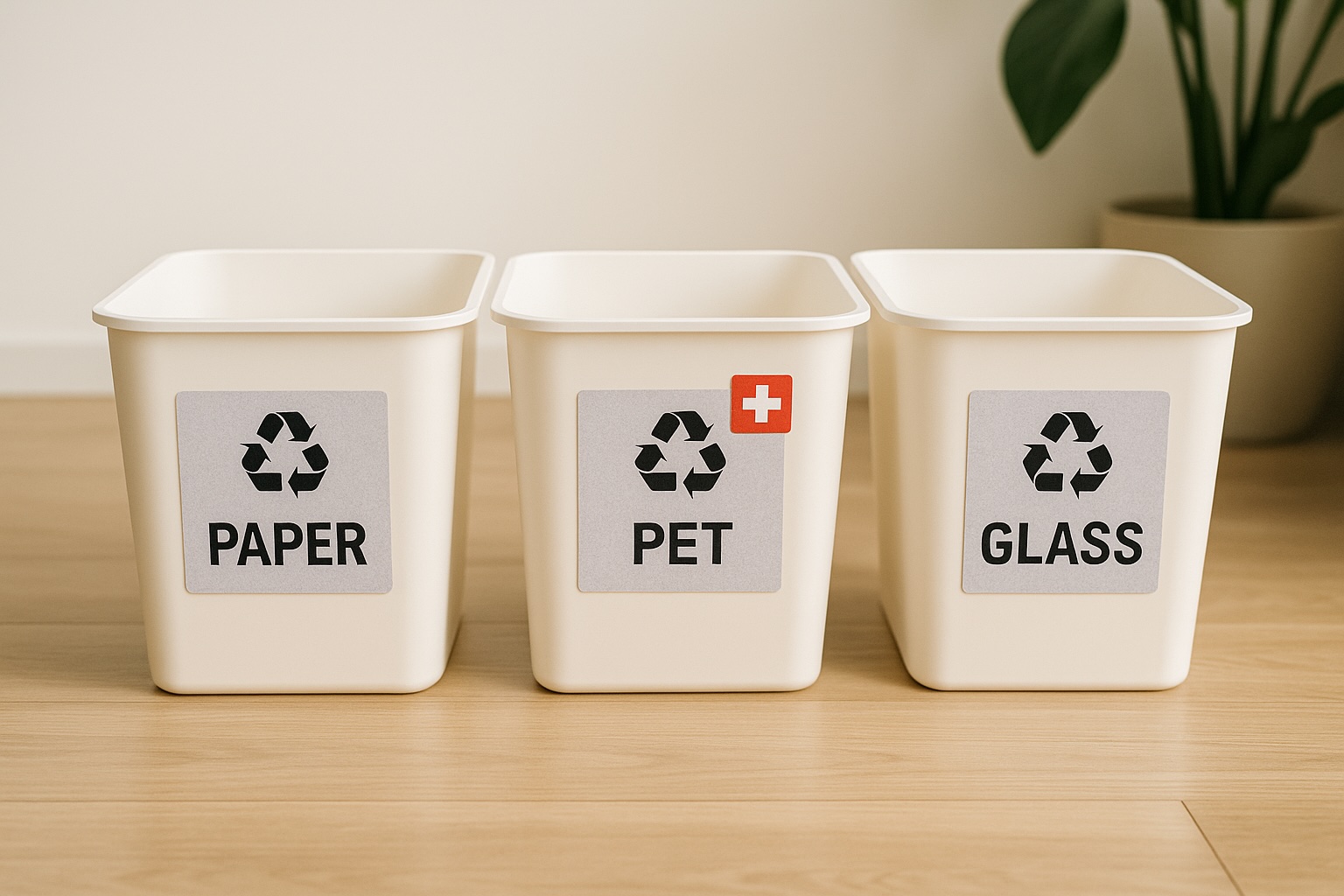Switzerland is a global leader in waste management and recycling, thanks to its well-organized systems, strong public awareness, and community responsibility. Whether you’ve just moved or are visiting long-term, understanding how to recycle correctly is essential. Not only is it a legal obligation, but it’s also part of Swiss culture. This guide will walk you through everything you need to know—from separating items correctly to where and how to dispose of them.
Why Recycling Matters in Switzerland
Recycling is not just encouraged—it’s expected. Switzerland recycles over 50% of its waste, one of the highest rates in the world. The country uses a “polluter pays” principle, meaning households are charged for the waste they generate, which provides a strong incentive to recycle and minimize trash.
General Recycling Principles
The system is decentralized, which means each canton or even municipality may have slightly different guidelines. Still, the core categories are consistent:
- Paper and cardboard
- Glass
- PET and plastic bottles
- Metal (aluminum and tin)
- Organic waste (compost)
- Hazardous materials (batteries, electronics)
- Household trash (paid bags)
Let’s look at how each is handled.
Paper and Cardboard
Paper and cardboard are collected separately.
What to recycle:
- Newspapers, magazines, books
- Clean cardboard boxes
- Office paper and envelopes
What not to include:
- Waxed or coated paper
- Pizza boxes or dirty paper
How to dispose:
- Bundle paper in stacks and tie with string (no plastic bags).
- Cardboard should be flattened.
- Drop off at communal bins or wait for scheduled curbside pickups (usually every 2–4 weeks).
Some areas have public recycling points; others require you to bring materials to a depot.
Glass
Glass is sorted by color—white (clear), green, and brown—and disposed of in public glass containers.
What to recycle:
- Wine, beer, juice bottles
- Jam and sauce jars
What not to include:
- Ceramic, porcelain, window glass, mirrors
How to dispose:
- Use communal glass containers in your neighborhood.
- Sort by color before placing items.
- Drop-offs usually allowed only during daytime hours (often 7:00–20:00) to reduce noise.
PET and Plastic Bottles
PET recycling is taken seriously in Switzerland, especially for beverage containers.
What to recycle:
- Soft drink and water bottles (with PET logo)
- Shampoo bottles (in some areas)
What not to include:
- Plastic bags, cling wrap, or food containers (these go in regular trash unless otherwise stated)
How to dispose:
- Use PET bins found in most supermarkets like Coop, Migros, and Aldi.
- Remove caps and compress bottles to save space.
Other plastics are often not recycled curbside and must be dropped off at specialized depots.
Metals
Cans, tins, and aluminum products are recyclable.
What to recycle:
- Soda cans
- Tinned food containers
- Aluminum foil (clean)
What not to include:
- Aerosol cans or paint cans (treated as hazardous)
How to dispose:
- Use public metal recycling containers or municipal centers.
- Some areas have metal pickup days.
Organic Waste
Not all areas collect compost, but when they do, it’s often through brown bins or collection bags.
What to recycle:
- Fruit and vegetable peels
- Coffee grounds, eggshells
- Garden clippings
What not to include:
- Meat, dairy, cooked food (some cantons allow this—check locally)
How to dispose:
- Use biodegradable compost bags.
- Drop off at communal compost bins or leave in brown bins for pickup.
If you live in an apartment, check whether your building has a compost collection system.
Batteries and Electronics
Switzerland mandates separate collection of hazardous and electronic waste.
What to recycle:
- AA/AAA batteries
- Light bulbs
- Old phones, laptops, chargers
How to dispose:
- Batteries can be returned to any store that sells them.
- Electronics can be brought back to retailers (even without proof of purchase) or dropped at recycling centers.
Do not dispose of batteries or electronics in regular trash—they contain harmful substances.
Household Waste and Paid Bags
General non-recyclable trash must be disposed of in official taxed garbage bags (called “Züri-Sack” in Zurich, “Gebührensäcke” elsewhere).
Where to buy:
- Available at local supermarkets and post offices.
- Sizes range from 17L to 110L.
How to dispose:
- Fill bag, tie it tightly, and place in designated collection area or container.
- Pickup usually happens weekly or bi-weekly.
The price of the bag includes a waste disposal fee, which encourages people to sort and recycle properly.
Clothes and Textiles
Many towns have clothing donation containers or designated days.
What to donate:
- Wearable clothes, shoes (tied in pairs), clean linens
What not to include:
- Torn or dirty clothes (dispose as waste)
Where to donate:
- Containers labeled for clothing (often run by organizations like TEXAID)
- Charity shops and Red Cross centers
Bulky Items and Furniture
Bulky waste (Sperrgut) includes furniture, mattresses, large electronics.
How to dispose:
- Some towns require a paid sticker per item.
- Others offer annual bulky waste days.
- Call your local municipality or check the website to confirm collection days or drop-off points.
Hazardous Waste
Items like paint, motor oil, chemicals, and medicines must be handled with care.
Where to dispose:
- Bring to special municipal drop-off points or chemist/pharmacy collections.
- Never dispose in regular trash or down the drain.
Check your canton’s website for proper dates and locations.
Tips for Success
- Check your local schedule: Municipal websites publish collection calendars.
- Use recycling maps: Many cities have online maps showing recycling stations.
- Label and sort: Swiss recycling is meticulous. Improper sorting can result in fines.
- Be courteous: Avoid late-night disposal and keep drop-off areas clean.
Final Thoughts
Recycling in Switzerland isn’t just about following rules—it’s a deeply ingrained part of everyday life. The system is efficient, environmentally friendly, and designed to reward those who participate correctly.
As a resident or expat, learning how to navigate this system is essential. With a little effort, you’ll not only avoid fines but contribute to one of the world’s most sustainable waste systems.
